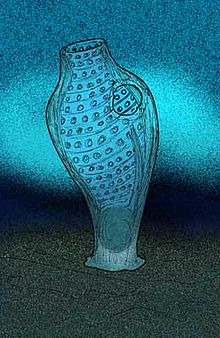Burykhia
Jump to navigation
Jump to search
| Burykhia Temporal range:
| |
|---|---|

| |
| reconstruction as a tunicate-like animal | |
| Scientific classification | |
| Domain: | Eukaryota |
| Kingdom: | Animalia |
| Phylum: | Chordata |
| Subphylum: | Tunicata |
| Class: | Ascidiacea (?) |
| Family: | †Ausiidae |
| Genus: | †Burykhia Fedonkin, Vickers-Rich, Swalla, Trusler & Hall, 2012 |
| Species: | †B. hunti
|
| Binomial name | |
| †Burykhia hunti Fedonkin, Vickers-Rich, Swalla, Trusler & Hall, 2012
| |
Burykhia hunti is a Precambrian fossil from the White Sea region of Russia dating to 555 million years ago. It is considered of ascidian affinity, due to the sac-like morphology and a series of distinctly perforated bands reminiscent of a tunicate pharynx. If B. hunti is a tunicate, it could be the oldest ascidian fossil known as of its publication in 2012.[1] It is possibly related to the slightly younger Ausia, another putative ascidian from the Vendian biota in Namibia.[1] In the case of Burykhia, the narrow longitudinal vessels support affinity with the suborder Phlebobranchia.
Burykhia does not appear to have been colonial.[1]
See also
References
- ^ a b c Fedonkin, M. A.; Vickers-Rich, P.; Swalla, B. J.; Trusler, P.; Hall, M. (2012). "A new metazoan from the Vendian of the White Sea, Russia, with possible affinities to the ascidians". Paleontological Journal. 46: 1. doi:10.1134/S0031030112010042.
Categories:
- Articles with short description
- Short description is different from Wikidata
- Articles with 'species' microformats
- Ascidiacea
- Tunicate genera
- Prehistoric chordate genera
- Ediacaran life
- Precambrian fossils
- Ediacaran Europe
- White Sea fossils
- All stub articles
- Tunicata stubs
- Ediacaran biota stubs
- Precambrian animal stubs
- Prehistoric deuterostome stubs